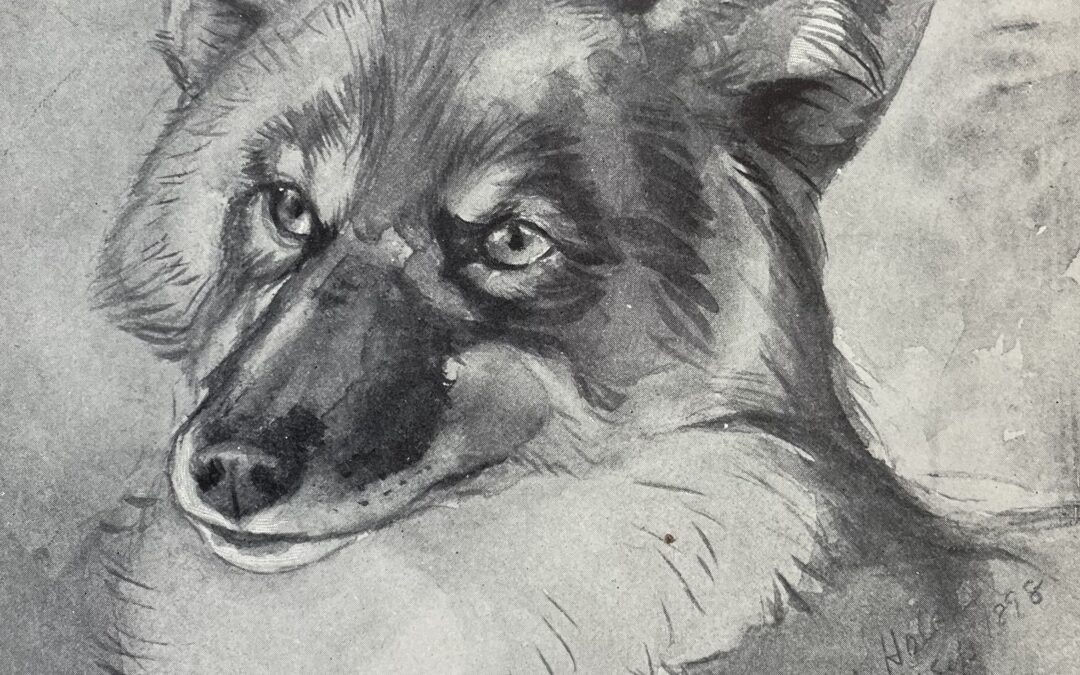Coyote Head, life study by Ernest Thompson Seton
This is one in an ongoing series of nature essays from Lives of Game Animals (1925-1928) by Ernest Thompson Seton. For an update about this subject check out Project Coyote and Dan Flores.
The Coyote
How to Destroy Him/Vol I pg. 399
“Coyote-hunting in an automobile is a sport that has been followed of late in the few parts of the west where still there are wide open spaces.
In view of the fact that the car can go 40 miles an hour indefinitely, and the Coyotes only 24 and for a short run, and the Coyote has no defense or means of attack to meet the onset of high-powered rifles, the element of fair competition is wholly lacking; that is, it cannot be called “sport.” As destruction, it would be more complete if the slaughterer would use aeroplanes for scouting and poisonous gas to “get” the creatures in rough places or any effective hiding.
During my early days in the West, I trapped and poisoned many Coyotes. I studied them so carefully and became so expert that I could get Coyotes with certainty by sundry tricks which played on the creatures’ strongest instincts and deep-rooted habits. I have not forgotten those tricks; and Coyote nature has not changed, so that I could go out to-day and gather up Coyotes if I would. But I do not propose to do so, and I intend that my unhallowed information shall die unrecorded. How to destroy him you shall never learn from me!”
The Spirit of the West/Vol I pg. 416-417
“O Wonder Dog of the West! O Song-dog of the Dawning! more than any other creature, the symbol of the medicine-making West! How I wish I could do justice to your spirit, to your meaning, to your way of life! If I could only voice the fierce, sad joy that you engender in me!
In memory’s eye, I see you as I used to see, perched on some upper perch, where, spread a little lower, was the Prairie-dog town, the teeming village of your vassals that owed you a living. I see you as I used to see, exchange a swift, yellow-eyed blink with the Wonder-she near by, your partner, your loved one. I see that comprehending, informational arrangeative blink of the eye. I see her crouch as you stalk openly forward, down and on, to the dog-town with its yapping, contemptible fat ones – stalk on alone, as though alone. And the chattering Prairie-dogs dodge down. Then, with a swift onset, your partner rushes out and hides behind some grease-wood bush that the Wistonwish left for reasons of his own.
Onward you march alone, and the chattering pot-bellies stick out their heads, seeing you, seeing you far away, and knowing nothing of the keen-eyed partner, sandy yellow on the yellow sand behind the grease bush. Now the Yappers grow bold and one ventures to seek for the food farther off. Then with a rush, the sandy yellow furry one is on him, chops him, and you come back to share the feast with your dear one.
Not much it takes to keep you happy, for you are in love, O Coyote! And also you have everything – food and health and strength, good hunting, and love. You could not be other than happy.
You sleep near each other under the shady yuccas. The red sun goes down, the cool of the evening is on the vast campagna that shimmered in the low-noon heat.
You are roused from sleep; you are impelled by the life-forces in and out of you to be up and doing. Your spirit is stirred, is uplifted, so not mere action can express your thrill, your exaltation; and like the prophets and saga-singers, you voice your spirit’s thrill in a song, a shouting, that is the very same in nature with the love-mad song of the nightingale, only louder, stronger, farther-reaching, as becomes the nobler, singing thing that you are.
Every plainsman of the West has heard and learned to love your song, and every dweller in the West that is to be will know it well, for still it sounds from the level buttes in the early dark.
Sheep-men may rage and governments set a blood-price on your head, – but wise are you as you are swift and brave.
Rejoice
From all parts of the West comes the same rejoiceful news – the Coyote holds his own and is even winning wider lands, and defies the cleverest machinations of the all-destroying Whiteman. How complete was the Redman’s understanding when he called you the “Wonder Dog,” and made you the incarnation of the Deity, the one who brought the divine fire to earth in the beginning, the one who will live to see it die when all the world is dead.
If the day should come when one may camp in the West, and hear not a note of the Coyote’s joyous stirring evening song, I hope that I shall long before have passed away, gone over the Great Divide, where there are neither barbwire fences, nor tin cans, nor hooch-houses, nor improvement companies, nor sheep-herds, nor flies, but where there is peace, and the Coyote sings and is unafraid.”

